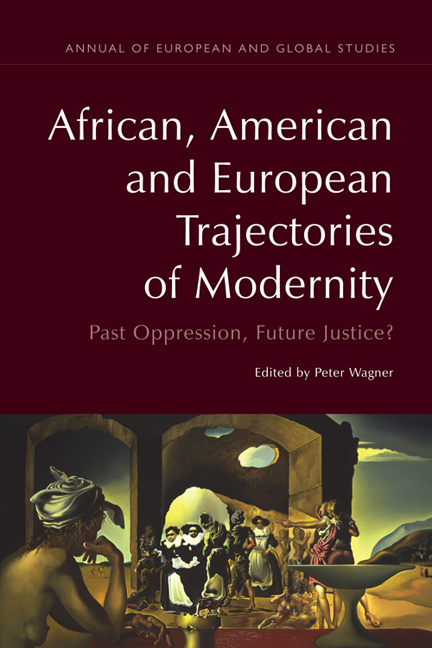Book contents
- Frontmatter
- Contents
- List of Figures
- Introduction
- Part I Reconstructing the History of Atlantic Modernity
- Part II Comparing Trajectories of Modernity in the South
- Part III Claims for Justice in the History of Modernity and in its Present
- 9 An Unsettled Past as a Political Resource
- 10 Injustice at Both Ends: Pre- and Post-apartheid Literary Approaches to Injustice, Sentiment and Humanism in the Work of C. Louis Leipoldt, Pumla Gobodo-Madikizela and the Film Invictus
- 11 The Student Movement in Chile 2011–12: Rearming the Critique of Capitalism
- 12 Indignation and Claims for Economic Sovereignty in Europe and the Americas: Renewing the Project of Control over Production
- Notes on the Contributors
- Index
9 - An Unsettled Past as a Political Resource
from Part III - Claims for Justice in the History of Modernity and in its Present
Published online by Cambridge University Press: 05 August 2016
- Frontmatter
- Contents
- List of Figures
- Introduction
- Part I Reconstructing the History of Atlantic Modernity
- Part II Comparing Trajectories of Modernity in the South
- Part III Claims for Justice in the History of Modernity and in its Present
- 9 An Unsettled Past as a Political Resource
- 10 Injustice at Both Ends: Pre- and Post-apartheid Literary Approaches to Injustice, Sentiment and Humanism in the Work of C. Louis Leipoldt, Pumla Gobodo-Madikizela and the Film Invictus
- 11 The Student Movement in Chile 2011–12: Rearming the Critique of Capitalism
- 12 Indignation and Claims for Economic Sovereignty in Europe and the Americas: Renewing the Project of Control over Production
- Notes on the Contributors
- Index
Summary
A PAST WITHIN the framework of transitional justice is reckoned with and assigned definite significance through the processes of truth seeking, prosecution, acknowledgment of suffering and ultimate redemption through reparations and targeted institutional reforms. This perception of the past and past reckoning reflects an understanding of society that overlooks the open-ended and deeply conflictual historicity of societal existence, captured in Castoriadis's notion of the social–historical. The failure to recognise continuous engaging with the past as the gist of societal existence is related to the dominant conceptualisation of modern society. A society is modern insofar as it is radically detached from its past, because the prevalent conceptualisation of modern temporality is progressivist, as are also transitional justice narratives. The reconceptualisation of society as social–historical allows for a much broader understanding of past reckoning as engaging with the past beyond the framework of transitional justice, its processes and mechanisms.
Certain changes in the field of past reckoning are heralded by the recent shift of focus and approach to transitional justice, suggesting ‘weariness of [conventional] institutions’ and moving away from the dominant understanding of transitional justice as ‘limited and linear’ movement (McEvoy and McGregor, 2008: 6). The motion is twodimensional– towards civil society activities on the one hand, and on the other, to the processes in everyday life of communities which experienced mass violence and possibly continue to experience tensions and divisions.
Transformative motions, however, retain continuities with the conventional approaches that focused on the roles of crime tribunals and official truth commissions, where the past is treated as a burden to be overcome. As will be argued here, such understanding of the past is informed by the modern future-oriented conception of time. In that context, past reckoning is successful only insofar as it delivers society of its traumatic past. By contrast, I shall argue, on the basis of Castoriadis's theory of the social–historical, that engaging with the past is an inescapable dimension of societal existence and its self-creative process. Such past is not necessarily a burden but can become a political resource in the (re)construction of political community. The resourcefulness of the past, however, is vitally dependent upon standing or permanent political institutions and normative frameworks, though this has been overlooked by previous analyses that focus on the importance of the ad hoc instruments of transitional justice and civil society.
- Type
- Chapter
- Information
- African, American and European Trajectories of ModernityPast Oppression, Future Justice?, pp. 197 - 218Publisher: Edinburgh University PressPrint publication year: 2015



